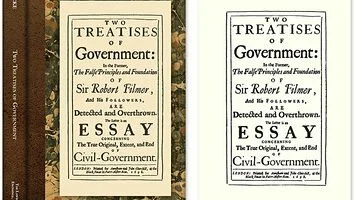By: Edgar Carvalho
Edited By: ALICE HURLEY and ANNA WESTFALL
John Locke begins the Second Treatise on Government by identifying the foundation of just governments. Turning away from the divine right of sovereignty, Locke affirms that God did not give Adam absolute authority. From this premise, he argues that Adam's heirs did not inherit divine rights. While one could refute the earlier premises on a teleological basis, Locke's third premise is historiographical: since it is impossible to trace down Adam's lineage, it is irrational to claim divine heritage. Locke then redefines political power, affirming the right to legislate for the protection of property. More importantly, this definition rests on the backing of the community, and the regulation of property being to the benefit of the public good.
As a key component of redefining political power, Locke examines the State of Nature. In this state, he theorizes that all are equal and free to act as they choose. While this notion of accentuated liberty is compatible with earlier philosophers, Locke further distinguishes himself by claiming that Natural Law exists even in a State of Nature. Guided by an innate desire for self-preservation, people naturally restrain their liberty (giving up rights that would place them at odds with each other) to live in greater social harmony. Locke provides evidence for the existence of Natural Laws in a State of Nature through an analogy of foreign jurisdiction. If a person commits a crime in a foreign country, they can be punished even though they are not citizens of said country. As long as the punishment fits the crime (with urgency on discouraging repeat offenses), any individual in a State of Nature can act in accordance with the Laws of Nature.
Following a glorification of the State of Nature and personal liberty, Locke turns to the evil inverses of the State of War and slavery. Locke defines the State of War as a conscious effort to take another's life. While both states share the lack of a common authority, the State of War is characterized by the use of premeditated force. Thus, the desire for common authority is integral to the State of Nature (eventually leading to the formation of a social contract) while unwarranted force promulgates the State of War. Locke adds a caveat to this discussion in claiming that the Law of Self-Preservation (as a corollary of the Law of Nature) allows for killing under self-defense. This premise relies on the assumption that an attack on property is a threat to liberty, and thus, killing is justifiable. Similarly, slavery breaks Natural Law because it contradicts the corollary Law of Self-Preservation. Arguing against slavery, Locke calls for freedom from absolute power. He defines natural liberty as the right to only be ruled by Natural Law. Likewise, he calls on social liberty as the right to solely follow laws consented by and for the benefit of the Commonwealth. Together, these liberties show the unlawfulness of slavery.
While Locke's liberal delineation of government is foundationally significant to modern democracies, his usage of the State of Nature seems implausible. I question whether there is any verisimilitude in attempting to envision the human being devoid of social contracts. The moment of birth in itself marks a contract between a parent and child. More importantly, this thought experiment assumes that human beings have unlimited liberty. Either this assumption rests on some sense of divine virtue, or it undermines the social nature of humanity. I firmly believe that every second of human nature has been imbued with social contracts. In other words, I cannot imagine a time when social contracts did not exist, to begin with. While Locke might contend that this was the case early on, his argument hinges on a massive assumption that contradicts decades of psychological research on social development. In all, Locke's Second Treatise of Government paved the way for liberalism (especially against monarchism), but on a hypothetical (rather than empirical) foundation.
BIBLIOGRAPHY:
Locke, John. 1980. Second Treatise of Government. Edited by C. B. Macpherson. Cambridge, MA: Hackett Publishing.




